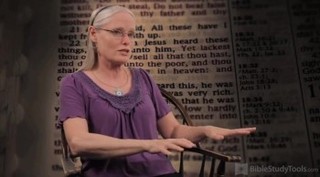
- Recent Translations
- All Translations
Videos for Esther 1:15

Esther 1:15 Meaning and Commentary
What shall we do unto the Queen Vashti, according to law
The king desired to know what law was provided in such a case as her's, and what to be done according to it:
because she hath not performed the commandment of the king by the
chamberlains?
as this was the crime, disobedience to his commands, he would have those who had knowledge of the law consider what punishment was to be inflicted on her for it, according to former laws, usages, and customs, or as reason and justice required; and it being a festival, and they heated with wine, was no objection to a consultation on this head; for it was the manner of the Persians at festivals, and when inflamed with wine, to consult and determine about matters of the greatest moment F23; yea, reckoned their counsels and decrees firmer than when made when they were sober F24; so the ancient Germans F25.
F23 Clio, sive, l. 1. c. 133.
F24 Strabo. Geograph. l. 15. p. 505. Alex. ab Alex. Genial. Dier. l. 4. c. 11. & l. 5. c. 21.
F25 Tacitus de Mor. German. c. 22.